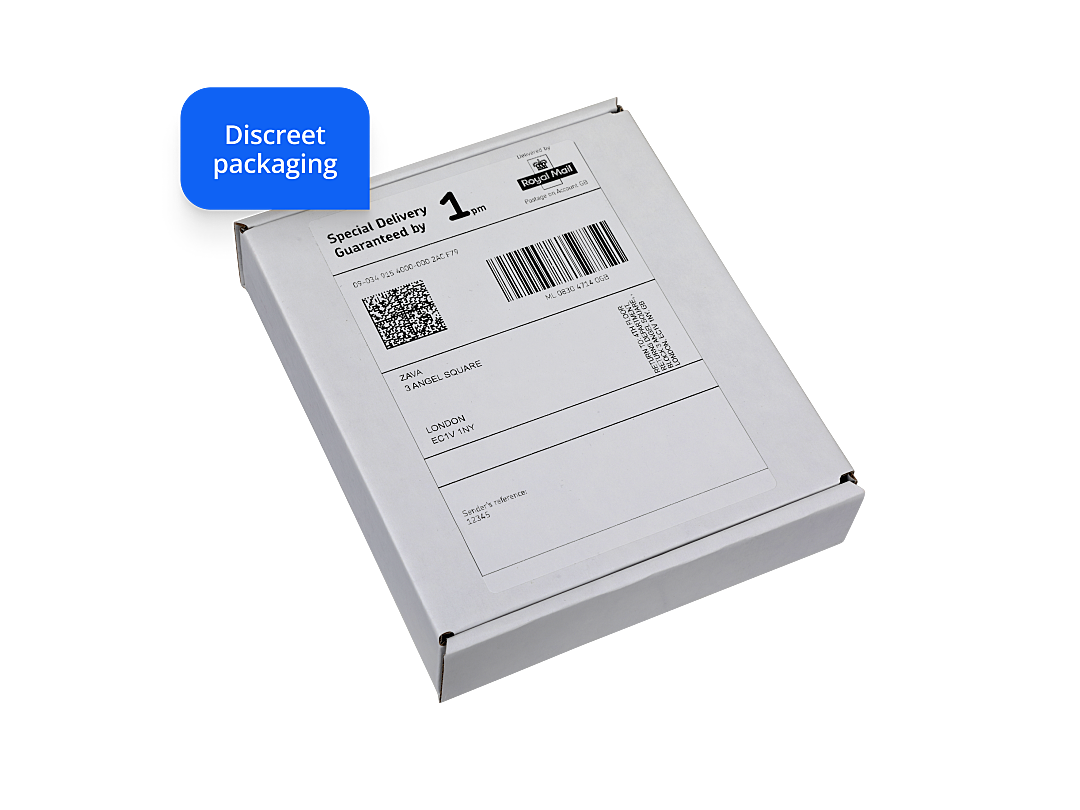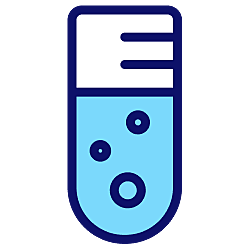AMH (anti-mullerian hormone) Test
An AMH test is a simple finger prick test that measures how much anti-mullerian hormone (AMH) you have in your blood.






-
An AMH test helps measure how much anti-mullerian hormone you have in your blood, and this indirectly lets you know how many eggs you have. The number of eggs you have is known as your ovarian reserve.
You’ll have fewer eggs as you get older and an AMH blood test is an easy way to check your ovarian reserve. An AMH test can help you decide whether or not you need to go through IVF treatment.
You can also use an AMH test to see if you’re getting close to starting your menopause.



-
-
AMH stands for anti-mullerian hormone, and it’s a substance that’s released from follicles in your ovaries. A follicle is like a bubble filled with liquid and over time it grows an egg inside it. Once an egg is ready to be released, the follicle releases the egg and transforms. Then the follicle produces progesterone to help support the development of a baby in case the egg gets fertilised by sperm. This also stops other follicles from releasing an egg at the same time.
As you typically release one egg every month during your menstrual cycle, the level of AMH you have in your blood at any one time is fairly stable. This means the amount of AMH does not change that much between your menstrual cycles, so we can measure your AMH to estimate how many eggs you have (your ovarian reserve).
As a woman, you are born with the maximum number of eggs you will ever have. Each follicle releases AMH before it develops an egg, so your levels of AMH will be high when you are young because that’s when you have the most follicles. You will have fewer follicles as you get older and not all of them will become eggs. With fewer follicles, there will be less AMH in your blood over time and hardly any when you reach menopause.
However, an AMH test cannot tell you how good your eggs are or how quickly you are losing your follicles. You may need to do more than one AMH test or do other tests, such as a progesterone test, to get a clearer picture of your fertility.
An AMH test can help you decide which direction you want to go in to help you get pregnant.
-
-
An AMH test is a type of blood test that you can do at home with an easy to use test kit from ZAVA.
Your blood sample will be tested in a medical lab where they can measure what your AMH levels are. If your AMH levels are within a certain range for your age, it’s likely that you have a good number of eggs in your ovaries and you will have a high chance of successfully getting pregnant.
A doctor will send you a detailed and confidential email explaining your results and the next steps you might want to consider in your pregnancy journey, such as further tests.
-
-
When you receive your AMH blood test kit, you’ll have everything you need to prick your finger and collect a small sample of blood. Then you’ll pack it back inside the box it came with and send it off in the post at no extra charge to you.
After your blood sample is tested for AMH at our trusted medical lab, you’ll get your results a few days later from one of our doctors. They will also give you advice on what to do next, including any further tests you may want to consider doing.
Your AMH test results are completely confidential and we do not share them with anyone unless you tell us to.
-
-
An AMH test is an accurate test to see how much AMH you have in your blood and gives an indication of how fertile you might be. You may need to take the test more than once.
To get the best results out of your AMH test you should:
- avoid taking medicines that affect your hormones for a few months before you do the test, this includes the contraceptive pill
- avoid doing the test if you are currently having chemotherapy
- cut down on or quit smoking
- try to lose weight if you have a high body fat percentage
- see a doctor if you think you might have PCOS (polycystic ovary syndrome)
- have a blood test to see if you have low vitamin D levels
- speak to a doctor about breast cancer gene testing if anyone in your family has had breast cancer in the past
- tell your doctor about any medications you have taken within the last few months
You may also need to take other tests to check if you have a health condition that could affect how accurate your AMH test result is. For example, you may need to check if you have PCOS (polycystic ovary syndrome).
-
-
You should take an AMH test a few months after you stop taking contraceptive pills or any other type of hormonal medicine.
If you do not take any medicines that affect the level of hormones in your body you can take an AMH test at any point during your cycle. This is because an AMH test only requires a small blood sample and your AMH levels tend to be quite stable month after month, although they do go down slowly as you age.
You may need to take an AMH test as recommended by your doctor to confirm how many eggs you may have or to support the results of another test that you might have taken.
Using an AMH test is one of the quickest and easiest ways to check on your fertility, especially if you are thinking about IVF treatment to help you have a baby.
-
-
An AMH test can tell you about the number of eggs you have in your ovaries around the time you took the test.
However, an AMH test cannot tell you about the quality of your eggs. So even though you might have low AMH levels, you may still have high quality eggs that you can use to get pregnant.
If you take an AMH test more than once, for example, every few months, you might be able to tell how quickly your egg count is declining. If you lose a lot of eggs, you may want to consider extracting and freezing your eggs at a young age. You can then use these eggs when you are older and will have better quality eggs to choose from to increase your chances of having a baby.
If your AMH levels are very low, this may be a sign that you are about to start or are currently going through menopause.
-
-
Your AMH test results will be ready within a few days after you send your blood sample in the post to our trusted medical lab.
One of our doctors will receive your results and have a look at what your AMH levels mean. They will then send you a secure email with your results and advice on what to do next.
Your AMH levels will be within a certain range for your age, and they can either be normal, high or low.
Normal range
If your AMH levels are within a normal range for your age, you have follicles and eggs which can be fertilised if you ovulate, and can try to have a baby. You might not need another AMH test straight away, but you can have one to check your levels of AMH at any time.
High range
Sometimes your AMH levels might be too high, and one reason for this could be polycystic ovary syndrome (PCOS).
Low range
Your AMH results may be lower than you expect if you take a contraceptive pill or other medication which can affect your hormone levels. Your levels of AMH can also be low due to other reasons such as:
- smoking
- having low vitamin D levels
- having a high body fat percentage or being overweight
-
-
There are currently no treatments available for AMH related infertility. This is because you have a fixed number of eggs when you are born and your levels of AMH reflect this number as you age. Taking man made AMH will not make your ovaries produce more eggs.
Your level of AMH in your blood goes down as you age and have fewer eggs. So as you get older, you may find it more difficult to naturally have a baby and IVF treatments may be less successful.
One way to get around your AMH levels going down is to extract your eggs at a young age and freeze them or use a donor egg. You will then have these as options to help you have a baby in your later years in life.
Even if you are young and an AMH test shows you do not have a lot of eggs, the quality of your eggs are more likely to be higher compared to when you are older. Keep this in mind when you take an AMH test, as it is only one of many types of tests that can help you make a decision on how healthy you are to have a baby.

Dr Babak Ashrafi Clinical Lead for Service Expansion
Accreditations: BSc, MBBS, MRCGP (2008)
Babak studied medicine at King’s College London and graduated in 2003, having also gained a bachelor’s degree in Physiology during his time there. He completed his general practice (GP) training in East London, where he worked for a number of years as a partner at a large inner-city GP practice. He completed the Royal College of GPs membership exam in 2007.
Meet our doctorsLast reviewed: 23 Dec 2021
-
Anti-Müllerian hormone, Society for Endocrinology [accessed December 2021]
-
Anti-Müllerian hormone (AMH) as a good predictor of time of menopause, PubMed [accessed December 2021]
-
Infertility Diagnosis, National Health Service [accessed December 2021]
-
AMH testing and what it can tell you, Healthline.com [accessed December 2021]








